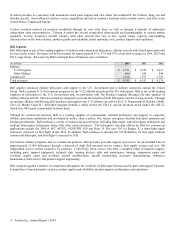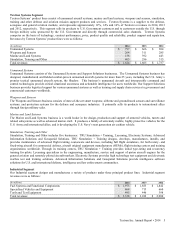E-Z-GO 2014 Annual Report Download - page 20
Download and view the complete annual report
Please find page 20 of the 2014 E-Z-GO annual report below. You can navigate through the pages in the report by either clicking on the pages listed below, or by using the keyword search tool below to find specific information within the annual report.regulations; production partners; product liability; patent and trademark infringement; employment disputes; and environmental,
safety and health matters. Due to the nature of our manufacturing business, we may be subject to liability claims arising from
accidents involving our products, including claims for serious personal injuries or death caused by weather or by pilot, driver or
user error. In the case of litigation matters for which reserves have not been established because the loss is not deemed probable, it
is reasonably possible that such claims could be decided against us and could require us to pay damages or make other
expenditures in amounts that are not presently estimable. In addition, we cannot be certain that our reserves are adequate and that
our insurance coverage will be sufficient to cover one or more substantial claims. Furthermore, we may not be able to obtain
insurance coverage at acceptable levels and costs in the future. Litigation is inherently unpredictable, and we could incur
judgments, receive adverse arbitration awards or enter into settlements for current or future claims that could adversely affect our
financial position or our results of operations in any particular period.
Intellectual property infringement claims of others and the inability to protect our intellectual property rights could harm our
business and our customers.
Intellectual property infringement claims may be asserted by third parties against us or our customers. Any related indemnification
payments or legal costs we may be obliged to pay on behalf of our businesses, our customers or other third parties could be costly.
In addition, we own the rights to many patents, trademarks, brand names, trade names and trade secrets that are important to our
business. The inability to enforce these intellectual property rights may have an adverse effect on our results of operations.
Additionally, our intellectual property could be at risk due to various cybersecurity threats.
Certain of our products are subject to laws regulating consumer products and could be subject to repurchase or recall as a
result of safety issues.
As a distributor of consumer products in the U.S., certain of our products also are subject to the Consumer Product Safety Act,
which empowers the U.S. Consumer Product Safety Commission (CPSC) to exclude from the market products that are found to be
unsafe or hazardous. Under certain circumstances, the CPSC could require us to repair, replace or refund the purchase price of one
or more of our products, or potentially even discontinue entire product lines, or we may voluntarily do so, but within strictures
recommended by the CPSC. The CPSC also can impose fines or penalties on a manufacturer for non-compliance with its
requirements. Furthermore, failure to timely notify the CPSC of a potential safety hazard can result in significant fines being
assessed against us. Any repurchases or recalls of our products or an imposition of fines or penalties could be costly to us and
could damage the reputation or the value of our brands. Additionally, laws regulating certain consumer products exist in some
states, as well as in other countries in which we sell our products, and more restrictive laws and regulations may be adopted in the
future.
The increasing costs of certain employee and retiree benefits could adversely affect our results.
Our earnings and cash flow may be adversely impacted by the amount of income or expense we expend or record for employee
benefit plans. This is particularly true for our defined benefit pension plans, where required contributions to those plans and related
expenses are driven by, among other things, our assumptions of the expected long-term rate of return on plan assets, the discount
rate used for future payment obligations and the rates of future cost growth. Additionally, as part of our annual evaluation of these
plans, significant changes in our assumptions, due to changes in economic, legislative and/or demographic experience or
circumstances, or changes in our actual investment returns could negatively impact the funded status of our plans requiring us to
substantially increase our pension liability with a resulting decrease in shareholders’ equity. Also, changes in pension legislation
and regulations could increase the cost associated with our defined benefit pension plans.
In addition, medical costs are rising at a rate faster than the general inflation rate. Continued medical cost inflation in excess of the
general inflation rate would increase the risk that we will not be able to mitigate the rising costs of medical benefits. Moreover, we
expect that some of the requirements of the new comprehensive healthcare law will increase our future costs. Increases to the costs
of pension and medical benefits could have an adverse effect on our results of operations.
Our business could be adversely affected by strikes or work stoppages and other labor issues.
Approximately 7,100, or 28%, of our U.S. employees are unionized, and many of our non-U.S. employees are represented by
organized councils. As a result, we may experience work stoppages, which could negatively impact our ability to manufacture our
products on a timely basis, resulting in strain on our relationships with our customers and a loss of revenues. The presence of
unions also may limit our flexibility in responding to competitive pressures in the marketplace. In addition, the workforces of
many of our suppliers and customers are represented by labor unions. Work stoppages or strikes at the plants of our key suppliers
could disrupt our manufacturing processes; similar actions at the plants of our customers could result in delayed or canceled orders
for our products. Any of these events could adversely affect our results of operations.
Currency, raw material price and interest rate fluctuations may adversely affect our results.
We are exposed to a variety of market risks, including the effects of changes in foreign currency exchange rates, raw material
prices and interest rates. Currency variations also contribute to variations in sales of products and services in impacted
14 Textron Inc. Annual Report • 2014
























